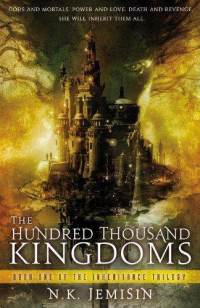Read This: The Hundred Thousand Kingdoms

The Hundred Thousand Kingdoms is N.K. Jemisin’s ambitious debut novel, and the first of her Inheritance trilogy. Set in the high palace of Sky, it is told in clear, beautiful language by its heroine, Yeine. The Hundred Thousand Kingdoms documents the last few days in the life of the recently orphaned young woman, a fragmented history of her family’s rise to and hold on power, and the ancient history of a God’s War that never truly ended.
***
Spoilers ahead.
“There were three gods, once” (6) is where Yeine’s story rightly begins. One god was killed, the second made a slave, and the third rose to rule the world through his primary worshippers, the Arameri family. Yeine’s mother was the heir to Arameri power before she renounced it for her barbarian husband. However, the love story of Yeine’s parents also involves revenge, and a bargain with fallen gods.
At first I anticipated another teen dystopia novel, since the protagonist is a nineteen year old woman summoned back to her mother’s ancestral home as another heir to her grandfather’s power. But Yeine is part of something else than the usual heroic exceptionalism. Yes, she is young, and her fate is extraordinary and involves massive shifts in the way power is wielded in the world. But she is no dystopian fantasy heroine. She knows the trap she has been summoned to spring, and that she was never meant to inherit: “There will be no decision’ I said…’And no contest. They will kill me at once and turn their attention back to each other” (10).
But it is not so simple as that. In addition to palace politics, Yeine was learning what her father’s life had cost. Her mother had bargained with the enslaved god and his children, and allowed a portion of the dead goddess’s soul to be put into unborn Yeine, because “In many ways, we mortals are more…versatile, for lack of a better term. More complete. For example, none of them can create or extend life. The simple act of having children…is a power that has been lost to the gods for millennia” (43).Through Yeine, the divine soul could be reborn and seek her revenge against her murderous brother: “Was that, then, why I had all these strange dreams and visions? Because a goddess’s soul had begun to rot inside me?” (185).
So although Yeine must die to secure the succession of one of her cousins to the Arameri throne, her death will unleash the goddess’s soul within her. “Then I closed my eyes and touched my chest. Nothing beat beneath my fingers; my heart had been destroyed. Yet something was there, giving life to my flesh. I could feel it. The Stone. A thing of life, born of death, filled with incalculable potential. A seed. “Grow,” I whispered” (380).
***
The Hundred Thousand Kingdoms is a strange and wonderful story. Jemisin produces a rich flavor of multiple cultures without delving too deeply into any but those of the Darre and the Amn, Yeine’s parent’s people. Even then, there are relatively few straightforward descriptions of cultural norms but many sideways references and shadowy, half-familiar allusions. It is enough to spur the imagination and create the full world.
The Amn people, to whom the Arameri belong, dismiss most of the world as barbarians. They were once barbarians like all the rest. But now, they are barbarians with immense wealth and power who effectively rule the world. What they decree as culture is merely their dominance, and they hold to their barbarism despite their position. Torture is normal to them, as part of both their entertainment and their worship. Also referenced, but not described, are cannibalism and incest.
Jemisin also has a take on godhood that reminded me of the imperfect Greek gods—her gods and godlings are immensely powerful but emotionally stunted. They are vain, jealous, vengeful, and needy. But there are other aspects to them plucked from various other mythologies and woven into her own. Nahadoth, darkness and chaos, is the firstborn god of the Maelstrom. Next came light and order as Itempas. Last born was Enefa, twilight, life, and death. They fought, they mated, they made the world and other gods. And Itempas killed Enefa out of jealousy, and imprisoned Nahodoth for the same. Other, lesser gods are alluded to, although they were killed in the legendary war. Again, as with culture, Jeminsin creates a full pantheon from suggestion.
***
The Hundred Thousand Kingdoms is beautifully written, and seductive in lulling a reader into complacency with gentle detail before throwing in a harsh bit of the world’s truth: the Arameri hunt and kill heretics and all their families because Itempas will bear no rivals; part of Yeine’s coming-of-age included being raped at thirteen because she could not defeat the man in combat; as a god, Yeine will kill her children and enslave her sibling to secure her position and exact a measure of vengeance for her own suffering.
It is hard to believably produce the abstraction of divine inhumanity. Jeminsin achieves it inconsistently in the novel, but when she does it is stunning. Yet The Hundred Thousand Kingdoms still seemed incomplete at the end, Yeine’s transition from mortal to god ambitious but somewhat unsatisfying. I’m not sure what was missing—perhaps that wonderful, suggestive mystery that infuses the rest of the text. The final chapter felt…too neat?…compared to what went before.
But that too-neat conclusion actually makes me want more. While the book ends at a natural point with Yeine assuming the mantle of godhood from dead Enefa, Jeminsin expanded the saga further into a trilogy. I have not read the rest yet, but the skill with which this story was told means I won’t wait too long to remedy that.
E.A. Ruppert contributes book and media reviews for NerdGoblin.com. Thanks for checking this out. To keep up with the latest NerdGoblin developments, please like us on Facebook , follow us on Twitter, and sign up for the NerdGoblin Newsletter.
And as always, please share your thoughts and opinions in the comments section!

